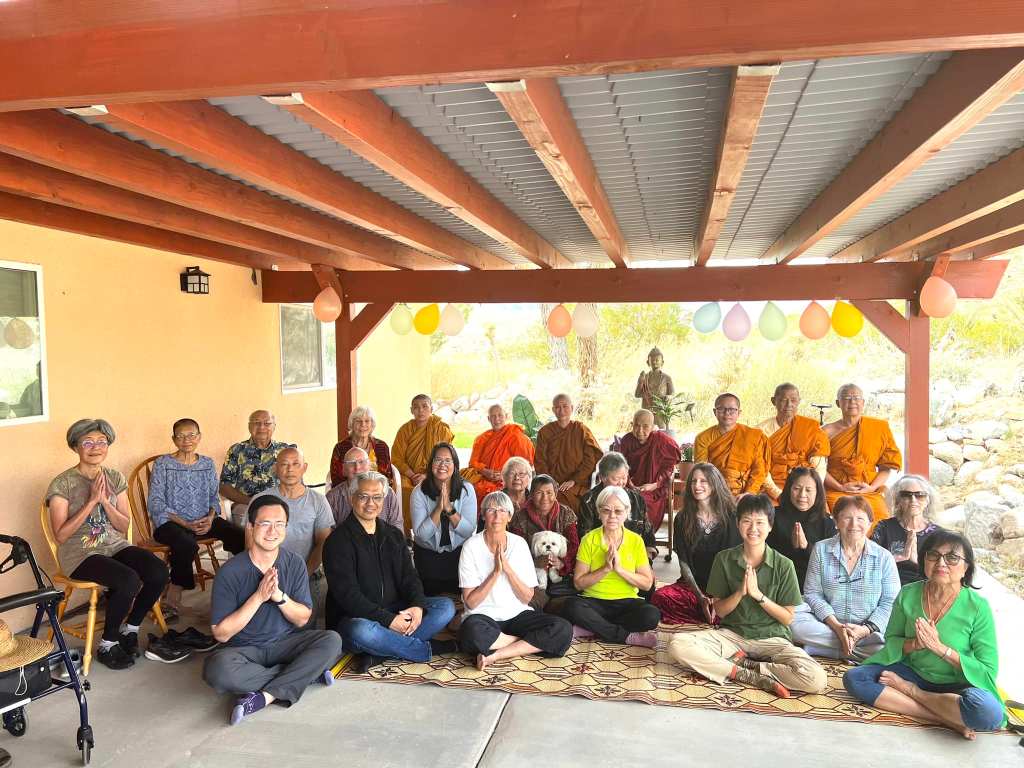Over 35 dhamma friends stayed overnight at Mahapajapati Monastery to listen to the Dhamma talk delivered by Ayya Viditadhammā (NS. Liễu Pháp)




Over 35 dhamma friends stayed overnight at Mahapajapati Monastery to listen to the Dhamma talk delivered by Ayya Viditadhammā (NS. Liễu Pháp)





Dear Dhamma friends,
We’d like to share some of the photos and a short dhamma talk delivered on Ayya Gunasari’s 91st Birthday!
Though we thought that only a few could participate Ayya Gunasari’s birthday, as it fell on a weekday, almost thirty could arrange their time to join. Thank you so much for your kind cooperation.
To my mind, the ceremony turned out very well, especially the moment we expressed our gratitude towards Ayya Gunasari. In my eyes, everybody felt very touched, and tears nearly fell down on the cheeks. What a wonderful feeling we had!
May we humbly share these pleasant feelings with those who could not make it on that auspicious day! Best wishes to you all !
May you be well, happy and prosperous on your spiritual path.
Ayya Ñānadīpā
——————————————————————————-
GRATITUDE OF OTHERS
Good morning, Dhamma Friends, On this auspicious occasion, Ayya Gunasari’s 91st Birthday, I would like to give Dhamma talk on “Gratitude of others”. I think it’s an opportune time to express my gratitude to Ayya Gunasari by giving this Dhamma Talk.
As you all know, all religious leaders taught us to be kind to others and to know the gratitude of others. Of course, the Buddha also taught us to be kind to others and to know the gratitude of others and also gave us guidance on how to pay back the gratitude of our parents, foster parents, teachers, mentors, supporters, and to those who helped you when you were in difficulty.
I think, you all are familiar with the discourse on Blessings (Mangala sutta) which belongs to the Eleven Protective Discourses, aren’t you? Some of you may even chant this discourse in your daily life. In this discourse, the Buddha
mentioned 38 types of blessings; knowing the gratitude of others is one of them. There are 12 stanzas in this discourse but let me recite the specific stanza which points out knowing the gratitude of others. “Gāravo ca nivāto ca santutthi ca kataňňutā, kālena dhamma sāvanam, etam mangalamuttam” which means reverence, humility, contentment, gratitude and the timely hearing of the Dhamma is the highest blessing. (gāravo ca – reverence, nivāto ca – humility, santutthi ca – contentment, kataňňutā – gratitude, and kālena dhamma sāvanam – the timely hearing of the Dhamma is the highest blessing.)
Moreover, the Anguttara Nikaya documented that these two people: one who is first to do a kindness, and the one who is grateful and thankful for a kindness done are hard to find in the world.
Those words of the Buddha advised us to value such kind of persons when we encounter them. How do you think, my Dhamma friends, is it valuable or valueless if something or someone is hard to find? Of course, someone who is hard to find is really valuable and precious.
Ayya Gunasari is such kind of person who cannot be easily found in the world. Out of her kindness and compassion towards the Buddhist female community, she established this Mahāpajāpatī Foundation specifically for Bhikkhunī, let me say, Buddhist female monks. We are really grateful to her for establishing Mahāpajāpatī Foundation. As you may know, it’s quite challenging to establish such a foundation in a remote desert. We can imagine how much effort she made in the early days of the foundation. She might encounter a burden of hindrances and difficulties but she overcame all the obstacles through her strong willpower and tireless effort.
Because of her compassion, kindness, and tireless effort, nowadays,Mahāpajāpatī is like an oasis where we all can meditate for inner peace. For that reason, we are really grateful to her. By the power of all the merits she has accumulated, may our mentor, Ayya Gunasiri be well, happy, and peaceful!
Happy Birthday to Ayya Gunasiri!

Dear Dhamma friends,
Hope you all are doing well. Mahapajapati Bhikkhuni Sangha is glad to inform you that we will enter the three-month rainy retreat, starting from August 2 (the full-moon day of Vaso) to October 30 (the full-moon day of Thadingyut, according to Lunar calendar).
Some of you may know the main reasons why we undertake the 3-month rainy retreat.
It happened during the lifetime of the Buddha; several monks went out for trips in the rainy season. As there was no vehicle in those days, they went on foot crossing some paddy fields. Consequently, the paddy fields got destroyed and also accidentally killed lots of insects by stepping on them. When the farmers made complaints and reported the matter to the Buddha, rules, and regulations regarding the rainy retreat were laid down for the Buddhist Sangha. From that time onwards, each and every member of the Buddhist Sangha must not travel during the rainy season. In case of emergency, for instance, their parents get sick and invite them, they may go but have to come back to the monastery within a week.
During the rainy retreat, members of the Buddhist Sangha should make a strenuous effort in meditation practice and learning the scriptures instead of traveling from one place to another so that lay devotees who support with four requisites gain merit.
Thanks to all lay devotees who give kind contributions to Mahapajapati.
May your good volition strongly support you to realize True Dhamma and gain ultimate peace!
May you all be well, happy, and peaceful!
With metta,
Ayya Nanadipa
Abbess of Mahapajapati